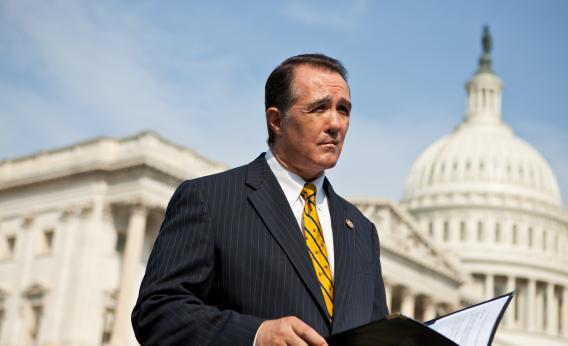The new NBC series Revolution debuts tonight with a terrifying but poorly explained premise: All the power in the world runs out for some mysterious reason.
It will probably add about as much intellectual heft to the ongoing policy battle over securing the nation’s critical infrastructure as The Words will bring to copyright laws. But a few lawmakers are genuinely concerned about two scenarios: terrorists hacking into our nation’s power grid or a one-in-100-year geomagnetic solar storm frying up every last transistor.
Last Wednesday, during a House hearing, Rep. Trent Franks, R-Ariz., stressed that the current power grid would be vulnerable in the light of an electromagnetic pulse disruption, which could be caused by a nuclear weapon or solar storm. Franks, along with panelists from the Federal Energy Regulatory Commission, the Department of Homeland Security, and the Department of Defense testified that an EMP attack would cause widespread power outages and unprecedented damage to the power grid. Since the Department of Defense relies on the civilian grid for 99 percent of its electricity needs, the panelists said that military infrastructure would be vulnerable as well.
Franks, who founded the EMP Caucus to bring congressional attention to the threat, is the champion of the SHIELD Act (Secure High-Voltage Infrastructure for Electricity From Lethal Damage), which he introduced in the House last year but has yet to leave the energy and commerce committee.
A storm on the scale of what the EMP fears has occurred has occurred only twice in the past 200 years in the United States— in 1859 and in 1921. Franks acknowledged under questioning from the FERC’s Joseph McClelland that there is no way to know how likely such a catastrophic event is. “The challenge before us is to ascertain what exactly that danger is—and we suggest to you that we don’t know fully what that is,” he said.
Still, zombies outrank the EMP threat in terms of public knowledge. Chris Beck, the president of the Electric Infrastructure Security Council, testified during the hearing that addressing the threat wasn’t a question of technology or finances, but of “increasing awareness.” Could Revolution solve that problem? I checked in with three of the big players in the EMP-threat world.
“If the television show gets people to think about hazards in a manner that causes them to prepare, then it will be beneficial,” said a FEMA spokesman.
A staffer from the Federal Energy Regulatory Commission declined to make any official comment on behalf of the agency regarding the show, but did mention that employees were excited to see it.
And Rep. Franks? He appeared to be on the fence on the show’s converting power as well, saying in a statement, “Loss of electricity for even one day is no laughing matter. Fully losing electricity for months or years would be disastrous beyond words.” Franks said that Revolution appeared to take long-term power outage seriously, and he hopes the show will bring more attention to the threat. But, on the other hand, he worries that “viewers will be tempted to believe that EMP and its effects are concepts only for Hollywood.”
A public policy problem could do worse than land as the subject of a hit TV series. But whether Revolution will end up igniting the EMP movement or putting it in the same class as the 2012 Mayan prophecies remains to be seen.
